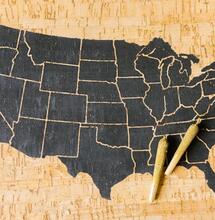History Made as DEA Moves to Reclassify Cannabis

The US Drug Enforcement Administration (DEA) has confirmed that they plan to re-categorise cannabis as having medical use and a low potential for abuse.
The US federal government is seeking to end cannabis’s position as a “Schedule I” controlled substance putting it on the same level as heroin and PCP. Instead, cannabis will be considered a Schedule III substance with other drugs like codeine. The Associated Press was the first to report the news.
Back in 1971, thanks to a hard push from hardcore prohibitionist President Richard Nixon, the DEA added cannabis to the list of Schedule 1 Controlled Substances. This means that it was considered to have no medical significance and a high potential for abuse like other Schedule 1 drugs including heroin and ecstasy.
The rescheduling follows a request made by President Biden to US Health and Human Services in October 2022 to review the scheduling of cannabis under federal law. As well as the simultaneous pardoning of federal prisoners convicted on cannabis charges.
The rescheduling comes with enormous consequences, from new research possibilities to tax reform for the cannabis industry. However, there are still hurdles to overcome. Alone, rescheduling does not decriminalise or legalise cannabis; nor does it promote interstate trade for the industry.
What will rescheduling change?
The new classification of cannabis will place it in a group with ketamine and Tylenol with codeine, and testosterone.
According to the DEA definition, Schedule III substances have “a moderate to low potential for physical and psychological dependence."
Potentially, one of the biggest impacts of rescheduling is the tax relief that it will offer businesses. Currently, cannabis businesses pay extortionate taxes of 65-75% and above. It also stops businesses from subtracting many expenses from their taxes. Thanks to the upcoming rescheduling, this policy will no longer be applicable, meaning that it could open up the industry to new growth and investment.
Rebranded as a Schedule III substance, scientists will also have an easier time accessing cannabis for research as well. Rescheduling may also have the knock-on effect of loosening restrictions surrounding the consumption of cannabis by federal employees.
What now?
The DEA’s proposal for rescheduling will now go up for public comment—likely through the General Election on Nov. 4. President Biden is expected to campaign on promises kept. One recent poll has shown the President obtaining an 11% bump in voter support as a report of rescheduling.
The latest reform developments offer the opportunity to boost pressure for more significant change in the future.
A win for Biden and VP Harris
The rescheduling action championed by the White House bookends a rebellious journey for the President and Vice President. They will go down in the history books as dealing this massive blow to cannabis prohibition.
“For a long time, people thought this was a gateway drug, and that was largely based on inaccurate information put out by the government. It’s just now shown to be wrong. Cannabis when used appropriately can have some beneficial effects for people" -cannabis tax expert and lobbyist Henry Wykowski
More From Soft Secrets:
Biden Calls for Cannabis to be Reclassified as Schedule 3






